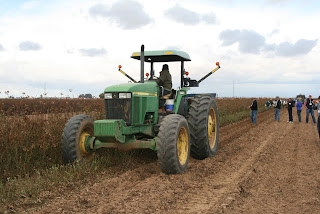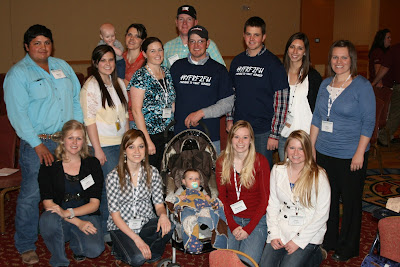I had intended to get this post out a little sooner than I did--As usual, life pops up and my second son, 9-years old, ended up needing an appendectomy--you just never know what adventures lie ahead when you get out of bed in the morning, so after a trip to see the surgeon in Utah and a couple days trying to recuperate (him and me!) I am thinking he is bouncing back way faster than me! He is doing great, can't even hardly tell he's been through the ringer, and my piles of things to do are slowly going down. So, here is the last of my tour info from the national Conference!
Welcome to the Crow's Dairy, just outside of Phoenix, AZ.
This was our third stop on our National Conference tour.
The Crow's who own and run this dairy are retired dairy farmer's. Yep, I did say retired. They milked cows for many years, raising a family, and finally retiring from the business, even selling off the farm because none of their kids wanted to run it.
And, yet, here they are running a dairy? Well, retirement gives you time to think, and time to look for new hobbies--maybe get a few goats to milk and make some fun kinds of goat cheese?
And here they are not even ten years from retirement of their first dairy and running a growing and progressive dairy on the outskirts of a vacation hotspot.
I cannot remember their first names, so I will go with Mr. and Mrs. Crow--the Mr., who ran a cow dairy for so long, swore that he hated goats milk, until he started drinking it, and as Mrs. Crow informed us, he has gained 15 lbs since. He loves it, he admits now. The jug in the picture above-=-his personal one in the cooler !
An idea to make a little homemade cheese turned into a two year trip around the country and even out of the country to try lots and lots of products and recipes in order to come up with the cheese that they now make and sell in these containers. They sell the majority of their cheeses, and now their homemade gelatto (Italian-style ice cream) to the resorts around them. High-end resorts, like the JW Marriott (where we were staying), who happens to be their biggest buyer.
Some o their bucks, Mr. Crow was showing us are pretty interesting--I never got a every good shot--but this gray-bodied male has udders/teats to compete with the milking mama's! I had never seen anything quite like that--he joked to us that he was a hermaphrodyte . But, all joking aside, this buck would probably sell for about $12,000 if he were ever to leave this dairy. He is the top producing Nubian Buck in the nation and they were even getting ready to ship one of his sons all the way to Australia.
This is the coolest 'nursing bucket' ever. Okay, at least I thought so--and maybe it wouldn't be as convenient for the big angus calves that we raise, head-butting it and sloshing all the milk out, but for these littler critters, it seems to come in real handy. There are straws connected to each of the nipples, and they fillit up and the kids gather round to get their fill.
Since the Crows got back into the Dairy business, they have actually found a family member who wants to be a part of the business--one of their daughters married after the cow dairy was sold to someone who had never been involved with the Ag or Dairy lifestyle, but who's life now revolves around it. In fact, this son-in-law runs most of the milking and processing and spends the majority of his day working here. His plan is to put in the time now and build the business so that he can really enjoy the benefits later. And it seems that each year brings greater demand and more opportunities. So, while the price was a little high to get started because all of the smaller equipment came from Europe, they are hoping that in the long run it will really be worth it. At $20 a gallon I'm thinking there is a pretty good chance. ;)
The Nubian goats do great in the Arizona heat, with their long ears to help them cool off, they are originally from the area of Egypt and that is why they do so well here. Curious, friendly, and they eat and poop LOTS less than cows! I think by the time we were done here, there were a lot of YF&R members considering the option of a little bit of goat milking-- Oh, and did I mention that their pasteurized milk sells for $20 a GALLON!!!
















































